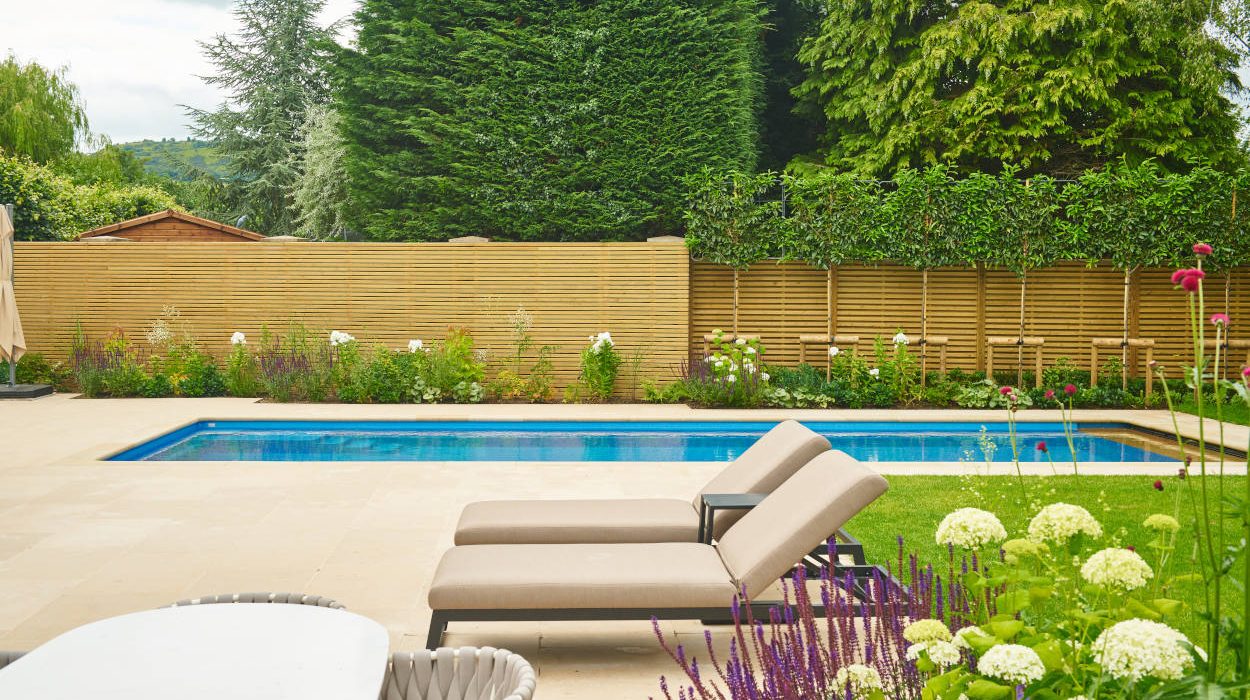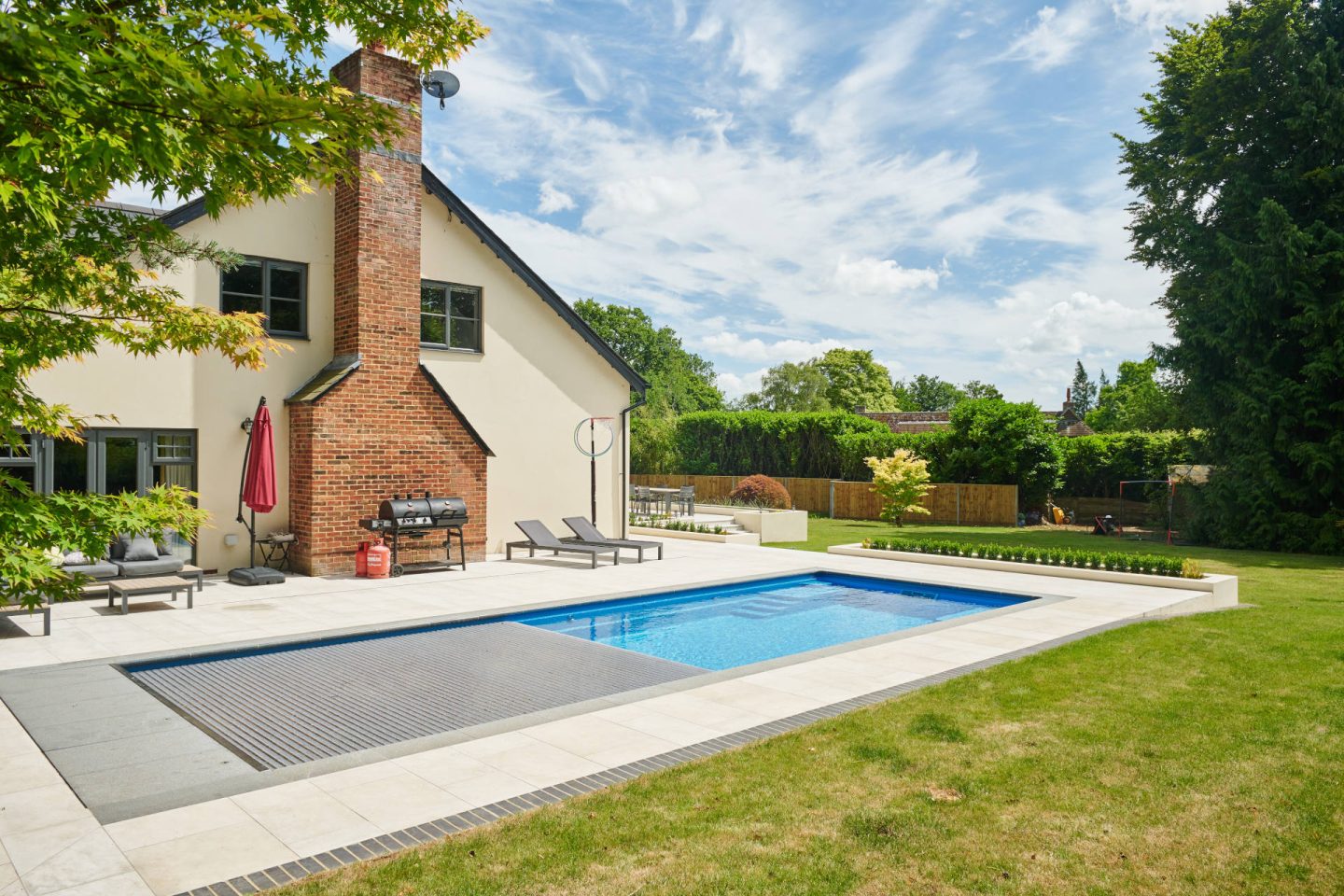Adding A Swimming Pool To Your Property: A Step-By-Step Guide
Share
Copy Link
With more homeowners opting to add private swimming pools to their properties, installing a pool has become an increasingly popular home improvement project.
While having your own pool comes with plenty of benefits like fun family time and added property value, undertaking such a major endeavour also requires proper planning and preparation.
Whether you dream of an in-ground concrete pool or a more affordable above-ground option, our guide will cover the essential information you need to dive into a successful pool installation project.
We chat to the experts at Compass Pools and explore the process of bringing your swimming pool dream to life!

Pool in Cheltenham by Compass Pools
Do I need planning permission for a swimming pool in my garden?
Installing a swimming pool in your garden requires careful planning, especially when it comes to securing the proper permits. In the UK, permission is rarely required but your local council can provide specifics on requirements in your area. Even if planning permission isn't needed, it's wise to check in with your local authority and notify your neighbours of the plans as a courtesy.
You'll also need a building regulation approval certificate from your local authority before starting construction. This ensures the pool is structurally sound and built to code. Building regulations will likely require features like enclosed ladder access, proper fencing and locks, and clear deck space around the pool perimeter.
Once you have the proper approvals and paperwork from your local council, you can move forward with the exciting process of excavation and installation. Taking the time to get the planning and permits squared away will start your pool project off on the right foot and ensure your garden transformation runs smoothly.
Do I need to prepare the site prior to installation?
Once all your paperwork is in order, the real groundwork can begin to prepare the site for installation.
One of the first decisions is choosing between an in-ground or above-ground pool. In-ground pools are sunk into the earth, allowing more customised shapes and sizes to fit your garden space. But they require extensive excavation and generally cost more. Above-ground pools are built on top of the ground, so they are quicker to install, cheaper and can be disassembled or moved more easily.
For in-ground pools, use spray paint or stakes to mark the pool's footprint on the ground where you'll dig the hole. Make sure you plan for adequate drainage and check if retaining walls are needed. For above-ground pools, clear any debris from the installation site and level the ground using either sand or a gravel base. Many above-ground pool kits include detailed site preparation instructions. Proper levelling is crucial to allow even water distribution within the pool.

Swimming pool in Somerset by Compass Pools
What is the installation process?
Once your site is prepped, the swimming pool structure can be assembled and installed. For in-ground pools, after excavation is complete, the pool floor is layered with gravel, sand and finally concrete for a smooth foundation. Rebar is added for reinforcement and a network of PVC pipes are put in place for the filtration system.
The pool shell, often made of concrete, fibreglass or vinyl, is then lowered into the hole and connected to the plumbing. Tiling is added along the interior finish. Any surrounding patios, decks or landscaping can then be built around the pool perimeter.
For above-ground pools, follow the manufacturer's instructions to assemble the frame, walls and liners on the prepared base. The curved metal sides are slotted together to form the outer structure, then the vinyl lining is added inside. Piping, pumps, filters, heating systems and other accessories can be installed as needed. Surrounding decks or patios can be added after.
Proper fencing, lighting, ladders, diving boards and other safety measures will need to be put in place around both in-ground and above-ground pools according to UK building codes. Your contractor can ensure these regulations are met. With the pool itself installed, you're nearly ready for that first dip!
What are the key finishing touches?
The fun part arrives when it's finally time to fill the pool and complete any last touches.
Slowly fill the pool basin and add any initial chemicals and treatments as needed to balance the water for proper pH and sanitation levels. Follow your pool contractor's specific guidance for ideal circulation, filtration and heating based on your pool size and climate.
Make sure all equipment like pumps, filters and heaters are functioning properly before filling is complete. Check for any leaks, cracks or issues with the surrounding patio and landscaping and address any concerns.
Install all safety and security measures like proper fencing, gates, covers, alarms and signage around the pool perimeter. Some key finishing touches like pool surround speakers, outdoor kitchens or minibars can add extra delight, or even neighbouring garden rooms for showering and relaxing after taking a dip.

Swimming pool in Hampshire by Compass Pools
How much does it cost to install a swimming pool in the UK?
Installing a swimming pool in your garden can be expensive, with the cost varying greatly depending on the type of pool and features you choose. Above-ground pools are the most affordable option, while concrete in-ground pools start around £25,000 and can exceed £50,000 for larger, more elaborate designs. Constructing and installing an outdoor pool can average just over £100,000.
Beyond the pool itself, additional expenses also factor into the overall cost. Properly preparing the site with grading, levelling and underground utilities can add to the price depending on the complexity. Securing the necessary planning permission, building regulations approval, and inspections will incur fees, while installing fencing, decking, heating systems, pool covers, and other desired features can tack on anywhere from £3,000 to £10,000 or more.
Careful planning is recommended to keep costs from spiralling. Above-ground pools offer a more budget-friendly swimming option to suit different needs and budgets. But with appropriate research and preparation, installing a pool can still be within financial reach to enhance your home's space.
Is it worth having a swimming pool in the UK?
Determining if installing a swimming pool is worthwhile depends on several considerations. The climate here is often cooler than ideal swimming conditions, so maximising usage with a pool cover and efficient heating system can help justify the costs for some. Ongoing maintenance like cleaning, heating, and chemical treatment takes both time and money to factor in as well.
In terms of resale value, adding a pool can increase a home's value by up to 20%, so it may pay off in the long run if you eventually sell. However, pools can also deter some buyers who don’t want to take on the maintenance.
Overall, with realistic expectations about cost, usage, and maintenance, installing a pool can be a worthwhile endeavour in the UK. For many homeowners, the expense is worth it for the lifestyle enhancement a pool can provide.
Installing a swimming pool in your garden is a major project, but the rewards are plentiful. With proper planning and preparation, what may seem like an intimidating process is very manageable when broken down into achievable steps. Be sure to research the necessary permits, hire reliable contractors, prep your site accordingly and establish a regular maintenance routine, to ensure you can fully enjoy your own personal garden oasis for many years to come.
Published: October 9, 2023



